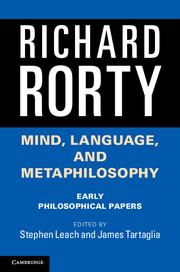Book contents
- Frontmatter
- Contents
- Foreword
- Acknowledgments
- Introduction
- 1 Pragmatism, categories, and language
- 2 The limits of reductionism
- 3 Realism, categories, and the “linguistic turn”
- 4 The subjectivist principle and the linguistic turn
- 5 Empiricism, extensionalism, and reductionism
- 6 Mind-body identity, privacy, and categories
- 7 Do analysts and metaphysicians disagree?
- 8 Incorrigibility as the mark of the mental
- 9 Wittgenstein, privileged access, and incommunicability
- 10 In defense of eliminative materialism
- 11 Cartesian epistemology and changes in ontology
- 12 Strawson’s objectivity argument
- 13 Verificationism and transcendental arguments
- 14 Indeterminacy of translation and of truth
- 15 Dennett on awareness
- 16 Functionalism, machines, and incorrigibility
- Index of names
- References
3 - Realism, categories, and the “linguistic turn”
Published online by Cambridge University Press: 05 June 2014
- Frontmatter
- Contents
- Foreword
- Acknowledgments
- Introduction
- 1 Pragmatism, categories, and language
- 2 The limits of reductionism
- 3 Realism, categories, and the “linguistic turn”
- 4 The subjectivist principle and the linguistic turn
- 5 Empiricism, extensionalism, and reductionism
- 6 Mind-body identity, privacy, and categories
- 7 Do analysts and metaphysicians disagree?
- 8 Incorrigibility as the mark of the mental
- 9 Wittgenstein, privileged access, and incommunicability
- 10 In defense of eliminative materialism
- 11 Cartesian epistemology and changes in ontology
- 12 Strawson’s objectivity argument
- 13 Verificationism and transcendental arguments
- 14 Indeterminacy of translation and of truth
- 15 Dennett on awareness
- 16 Functionalism, machines, and incorrigibility
- Index of names
- References
Summary
Realist criticism of linguistic philosophy
Among contemporary realistic philosophers there is a tendency to see the history of philosophy from Descartes to Wittgenstein as one continuous process of garnering the wages of sin. One can identify the original sin as the representative theory of perception, as the confusion of noetic being with being as such, or in various other ways. In any case, the dialectical progression which in the course of three centuries has led philosophers away from things to ideas, and away from ideas to words, presents itself as the enactment of an agonizing drama of self-destruction.
Given the initial Cartesian sundering of cognition from the object of cognition, it was only to be expected that epistemology should claim priority over metaphysics. Once this happened, it was only a matter of time before metaphysics shriveled away and died. In due course, epistemology, finding itself unable to function as an autonomous discipline when deprived of metaphysical support, was pushed aside by its ungrateful child, linguistic analysis. The ultimate, foredoomed, result of this development is, according to such neo-Thomist descriptions of recent philosophy as that of Oliver Martin, the total confusion of the theoretic and instrumental orders, and the consequent replacement of philosophic controversy by ideological conflict. Linguistic analysis, Martin says, though not itself an ideology, is at the service of ideology through being “one of the many non-philosophical forms of anti-philosophy.” Probably, Martin continues, “It would not exist were it not for the fact that professors of philosophy who no longer believe in philosophy must do something if they are to continue to receive a salary for doing that which they profess to be impossible.”
- Type
- Chapter
- Information
- Mind, Language, and MetaphilosophyEarly Philosophical Papers, pp. 55 - 68Publisher: Cambridge University PressPrint publication year: 2014
References
- 2
- Cited by



